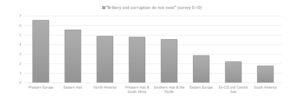
Corruption and ethical practices perceptions
The issues of governance scandals and corporate control failures are perennial and persistent. In the last year, companies and industries ranging from airlines to banking, data analytics, health technology, marketing, transportation and delivery, have been exposed to situations related to abusive or discriminatory working relationships, bribery, corruption, data breaches, or just simple fraud. The implication of any of the above is destructive for all stakeholders of a company: customers, employees, investors, and executives are all affected in different aspects of their lives. Equally important, is the fact that the society as a whole is also affected because the presence of corporate scandals erodes the confidence in organizations, increases the uncertainty and thus the cost in investing; it ultimately harms the credibility and reputation of officials and institutions at the firm and country level.
In this edition of the criterion of the month we present the relationship between variables from our dataset that capture the perception on corruption and practices within firms.
Research on corporate governance points to the legal and institutional framework as mechanisms that can address control failures. They are related with the rule of law in a country, the strength and independence of the judicial system, and the time it takes for decisions to be finalized and implemented. The top panel in Figure 1 presents the responses by mid- and upper level managers from our Executive Opinion Survey as to the existence of bribery and corruption. The answers are aggregated at a regional level and the higher number denotes a perception of lower presence of bribery and corruption in the country. As the figure outlines, Western Europe is characterized by the lowest presence of corruption followed by Eastern Asia and North America, while South America exhibits the highest.
Figure 1: Corruption perceptions by region
Figure 2: Ethical practices by region
Figure 3: Corruption perceptions and corporate board supervision on management
Even more telling is the relationship between corruption perceptions and implementation of ethical practices at the firm level. Figure 4 identifies a strong positive relationship between the two criteria with a correlation coefficient equal to 0.90.

Figure 4: Corruption perceptions and ethical practices in companies
Research Information & Knowledge Hub for additional information on IMD publications

Global market shifts and turbulence in 2025 mean Chief Financial Officers must take into account inflation, trade tensions and shifting regulations to ensure long-term growth

Asia's economic landscape 2024 and 2025. Three distinct approaches: Japan's technology-driven revival amid demographic challenges, China's deflation and growth concerns, and India's manufacturing ambitions through foreign investment and strategic ...
Companies don’t operate in a vacuum. Corporate leaders have to navigate political dynamics, and in Chapter 12 we discuss nonmarket strategies. But there’s a global dimension to sustainability that’s worth a separate discussion. Will rising geopoli...
Today’s chaotic and turbulent competitive context means the board’s role is more important than ever. Beyond their traditional oversight role, boards today are critical in shaping strategy, managing risks, maintaining accountability, and driving i...
With stagnant import volumes since 2021, and import prices at levels below those suggested by fundamentals, foreign exporters face an uphill battle to convert access to the Chinese market into revenues. Notably, the volume stagnation predates the ...
Didier Cossin and Yukie Saito outline some of the common blind spots and skills gaps that exist on corporate boards – and how L&D teams can help
World exports of goods and services enjoyed boomtime growth in the 1990s and early 2000s. Since 2008, trade in goods – specifically manufactured goods – have plateaued; services exports have not. Services trade continues to ride the go-go growth p...

Early in his career, Dolf van den Brink, CEO of Heineken since 2020, did everything he could to project an image of authority – including wearing spectacles he didn't need. It wasn't until he learned to be comfortable in his skin that he began to ...
The trade policy stance of foreign governments to China’s goods exports is reviewed here. A balanced approach is taken— examining new import reforms facilitating sourcing from China as well as new import curbs. Further perspective is provided by c...
On the campaign trail, Mr. Trump slammed subsidy-driven approaches to attracting foreign investment in U.S. manufacturing. Putting tariffs on imported goods and saving subsidy outlays was his preference. Since 2017, the United States has seen two ...
Research Information & Knowledge Hub for additional information on IMD publications
in I by IMD
Research Information & Knowledge Hub for additional information on IMD publications
in Binder, Julia Katharina (Ed.); Haanaes, Knut Bjarne (Ed.) / Leading the sustainable business transformation: A playbook from IMD, pp. 47-57 / Hoboken: Wiley, 2025
Research Information & Knowledge Hub for additional information on IMD publications
Research Information & Knowledge Hub for additional information on IMD publications
Research Information & Knowledge Hub for additional information on IMD publications
Research Information & Knowledge Hub for additional information on IMD publications
The World Trade Organization Report / Trading with intelligence: How AI shapes and is shaped by international trade, p. 26 / 2024
Research Information & Knowledge Hub for additional information on IMD publications
Research Information & Knowledge Hub for additional information on IMD publications
Research Information & Knowledge Hub for additional information on IMD publications
Research Information & Knowledge Hub for additional information on IMD publications




